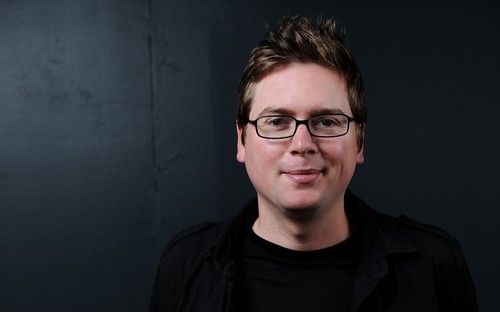One by one the next generation of thought leaders, sweaty in their buttoned-up shirts, hopped out of class to navigate corridors and descend the steps to the front of the stage. The MBA students were gathered to talk Twitter, an occasion they dare not miss.
The star of the show was Biz Stone, the co-inventor of the social media site adored the world over. The American moved quickly onto the stage, un-phased by the growing crowd, and took his seat in front of a backdrop of school banners.
Eight years after co-founding a company which sparked a social media revolution, Biz, now 40, was calm. He is unobtrusive: medium build, with brown hair and glasses, and an uber-relaxed manner broken only with witty humour. His presence does not smack of millionaire geek. Biz's net worth is estimated at $200 million.
His responses are calmly delivered, only wobbly when challenged on Twitter’s censorship in some countries. The infamous blue-and-white bird logo, he says, was designed to “represent freedom of expression”. Enough said.
They are also full of tall tales. His rags to riches story is perhaps one of the greatest in techlore.
This one is about Christopher Isaac Stone, who endlessly ridiculed Twitter as “useless” but has helped turn his co-invention into a $40 billion business.
This one is about a college dropout who once packed boxes for a publishing company to earn a living, and who had failed in his attempts to create innovative technology products. It is also about the phenomenal rise and growing controversy surrounding a social media behemoth, whose CEO Dick Costolo is under pressure from investors to turn around a declining user base and falling stock value.
Twitter was born from failure. The product of an art school drop-out, a software entrepreneur, a programmer and a software developer has grown into a sprawling empire with 3,000 employees spanning across the globe.
Founders Biz, Jack Dorsey, Evan Williams and the lesser-known Noah Glass are some of the most successful entrepreneurs in tech history. Twitter, whose stock price has been volatile, has surged nearly 170% since its $26 initial public offering in November.
But everyone, says Biz, would tell them it was a “useless toy” in Twitter’s early days. “The biggest argument was that Twitter was not useful. And Evan had a great remark: ‘Well neither is ice cream. Shall we ban ice cream and all joy?’” he laughs, crossing his right leg over the other, his dark grey and orange-striped socks poking out of his sneakers.
The numbers do not bear the naysayers out. The micro-blogging site has amassed 225 million active users, although promising early growth has started to slow. Politicians, celebrities and average Joes' alike are hooked.
Biz had tried and failed to launch similar ventures. In 2002, he launched a messaging service called Sidemarker, he says, and while working for Google in 2003 he tried to get blogging-on-the-go started. “Nobody took to that either,” he sniggers.
At early-stage Twitter, there were also “a lot of hard times”. Another entrepreneur might have been tempted to give up. What kept him going?
“Because I was experiencing so much joy I just kept working,” he says. “It turns out that that would carry me through a lot of hard times, a lot of times when I would’ve otherwise listened to all the naysayers and wanted to quit because of all the problems,” adds Biz.
Maintaining growth, however, has been Twitter’s biggest challenge so far. Even though it has been beating its revenue targets, eyebrows have been raised about user growth, which has slowed 6% quarter-on-quarter by the last earnings statement in April. The company’s share price has also fallen 40% so far this year.
Biz left in 2011 but has not ruled out a return. Although his focus is now on other ventures.
In late 2005, a young buck was busy trying to mint his first fortune at Google. He had joined the internet search giant after helping to launch Xanga Inc, an early social networking website which provided blogging services.
Evan Williams, then a colleague at Google, had decided to quit and run his own venture, a podcasting company called Odeo. Biz, an aspiring entrepreneur, followed suit.
But business was not booming. Evan, then the boss, told them to take two weeks off and work on new ideas.
A young programmer brought Biz over to his desk and opened up AOL instant messenger. There was an empty text box next to his status box. He noticed many of his friends were typing silly messages into it.
“He said: ‘Look at this. Do you think we could build a network based entirely on this idea?’” recalls Biz, looking down at his hands, clasped together over his right knee.
He continues: “I thought: wouldn’t it be cool if we built a network, but we built it using SMS protocol, because I always loved the idea of taking something that’s meant for one thing and using it for another. So that’s what we did. We took those two weeks and we said let’s make a system that allows us to say what we’re doing, and those that care will get the message, and those that don’t care won’t get it.”
For a while it was all fun and games. Biz smiles as he looks back at those start-up memories, before Twitter was Twitter Inc., and before the co-founders were propelled onto the world stage.
He used to live off his credit cards. “I racked up some much debt that I calculated that it would take me over 200 years to pay back,” he says, before adding: “I just kept saying future Biz will work it all out.”
He didn’t realize the company’s significance until March 2007. The co-founders were at South by Southwest, a festival in Texas, were a “bunch of nerds” get together and talk about their latest projects.
Everyone’s laptops were open. And everyone was on Twitter. “Until this point it was just us in a little crappy office having fun,” he laughs.
On another occasion, he was told a story which changed his thinking. A Twitter user trying to have a quiet conversation in a bar but who couldn’t because of the noise sent out a tweet urging people to move to a new location.
“In the eight minutes it took him to walk to that pub it had filled completely to capacity. The metaphor that came to mind was a flock of birds moving around an object in flight,” says Biz.
He adds: “At that moment I realised that our toy was still a toy, it was fun, but it was also potentially very important… we founded Twitter Incorporated a few days after that… after that we got serious.”
Biz’s tech stardom couldn’t be farther afield from his background. Helping to set-up a billion-dollar enterprise was probably not what he had in mind when he started out at the University of Massachusetts in Boston.
He had a full four-year arts scholarship, but was lured away by a job offer at a publishing company. He initially worked part-time for the firm, lifting heavy boxes, until a courageous stunt, when he snuck onto his boss’s computer and designed an unauthorized book cover, earned him a job.
Biz, who grew up without a father and worked as a designer for three years, was inspired by his then boss to set-up his own firm.
He eventually diversified into web design – “because in the late 90’s I could charge whatever I wanted” – before a friend asked him to go into web design business with him full-time. Biz began flirting with social media networks, which eventually led him to joining Google – although “it was a complete sham the way I got hired”.
But the conversation quickly steers back to Twitter. Biz lights up when he recalls that his biggest surprise was how fast politicians and celebrities took to the micro-blogging site. “The whole point of being a celebrity is that you have limited access to that person – that’s their value,” he says.
Politicians, on the other hand, are better able to connect with constituents, he says. “That’s a wonderful thing. I think Twitter did have an impact… it changed democracy. It changed the pace of democracy. It made it faster.”
It’s a bold statement. But tweets are no longer his business. After flying from the Twitter nest in 2011, he set up the Obvious Corporation, a start-up incubator, with Evan. Biz lives in Marin County, California with his wife and son Jacob. He is a Fellow at Oxford University and holds an honorary Doctor of Laws from Babson College.
In April last year Biz set-up Jelly, a mobile app which helps people find answers to queries through photos and maps. He has been the firm’s CEO ever since.
“I like being CEO; it’s fun,” he laughs, just before sneaking off stage. “I’ve also been a film director. That was fun, but that’s like being a CEO; you’ve got 200 people and you’re in charge of everything.”
RECAPTHA :
10
a4
23
1e








